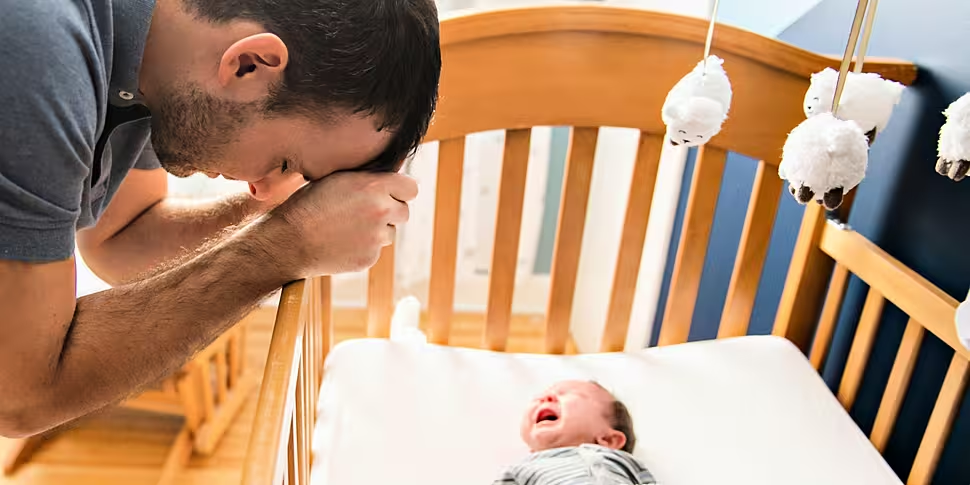A man who suffered from postnatal depression following the birth of his first child said he became good 'wearing a mask' to hide his feelings.
Studies have shown that postnatal depression affects 10% to 15% of women within the first year of giving birth.
Data on how the condition impacts men is much harder to quantify as not many men come forward.
Monaghan man Fin McKenna-Fox recently returned home from Australia after his wife Shona gave birth to a baby girl.
He told Sarah Madden for The Pat Kenny Show he wanted to be supportive for his family.
"Before I had my first kid, the big thing for me was wanting to be a really present father, wanting to be really active in the fatherhood journey, not just be a babysitter," he said.
"As well as that I very much wanted to be a rock of support for my wife.
"Living in Australia we didn't have family around us, so that put me in a position where I wanted to be really strong to provide that for her."
Mr McKenna-Fox said he repressed his own issues for far too long.
"Something switched in me so I had to be the provider for them, not just the provider financially [but] emotionally to give that support, to be that anchor for them," he said.
"I pushed all of my own stuff down, and I kept putting it down until I couldn't put it down any further and it just had to come out.
"For me it was like high stress, anxiety, panic attacks".
 Parents teaching child letters. Image: Roman Lacheev / Alamy
Parents teaching child letters. Image: Roman Lacheev / AlamyMr McKenna-Fox said he put on a brave face at work and at home.
"I was seeing lots of clients as well as supporting my wife and as soon as clients would leave, they'd float out the door feeling absolutely amazing and I'd just see myself collapsing in a heap on the floor," he said.
"I just [felt] 'I can't do this anymore', and then I'd pick myself up, put on a brave face and go home and be that rock for my wife".
Mr McKenna-Fox said his wife was 'oblivious' to how he was feeling.
"As a man I felt as though I need to be strong, I can't show weakness, I can't show vulnerability," he said.
"I was really good at wearing a mask that everything was OK, but deep down I was really struggling within myself.
"I lost who I was; I didn't really know how to support myself and support her.
"It just got the point where a couple of big things had happened and I just had to sit her down and actually explain what was going on in my mind.
"She was blown away".
 Tired or stressed businessman sitting in front of computer in office
Tired or stressed businessman sitting in front of computer in officePsychotherapist Susi Lodola said data on male postnatal depression is hard to come by.
"Research is unclear of exactly the numbers because not a lot of men come forward," she said.
"But roughly 10% of men would experience postnatal depression.
"Maybe not as much tears as you would associate with women maybe; it could be anger - more anger than usual.
"Men might also engage more in risky behaviours than women would, maybe more substance misuse.
"It is a way of trying to cope with the daily situations and maybe avoiding those situations".
Ms Lodola set the onset is usually much later in men than in women.
"Women tend to get it maybe five or six weeks after birth, whereas men usually develop it maybe within the first year".
'It was horrific'
Mark Williams said things started to feel different right from the beginning.
"I think things changed when my wife went into theatre; she had an emergency C-section," he said.
"The doctors came rushing in and they said, 'We need to get into theatre quick'.
"It was the first and only time I actually had a panic attack.
"I was expecting [to] cut the baby's cord and off we go, happy families.
"Thinking your wife and baby's going to die in front of you, it was horrific for me".
'Suppressing those feelings'
Mr Williams said his wife 'wasn't the same person' after the birth.
"When she got discharged, things really escalated to the point where my wife tried to take her life by suicide," he said.
"I had just changed my job to be self-employed... we had money worries, a new mortgage.
"Isolation and loneliness - I was suppressing those feelings because I couldn't tell my wife how I was starting to feel.
"I didn't want it to impact on her mental health".
Mr Williams said he was feeling frustrated, irritable and "something that I never experienced before".
'A place of exclusion'
UCC lecturer Dr Lloyd Philpott said he believes maternity services need to be changed.
"The maternity services are for the mother and for the infant," he said.
"The infant is a client of the maternity services and the mother is a client of the maternity services, but the father isn't.
"So, in a sense even for fathers to seek help during this period within the services that are provided there's no place for them.
"It's a place of exclusion," he added.
Dr Philpott said a good starting place would be proactive support groups for new fathers.
Anyone affected by issues raised in this article can contact The Samaritans on on 116 123 or email jo@samaritans.org
More information can be found here









